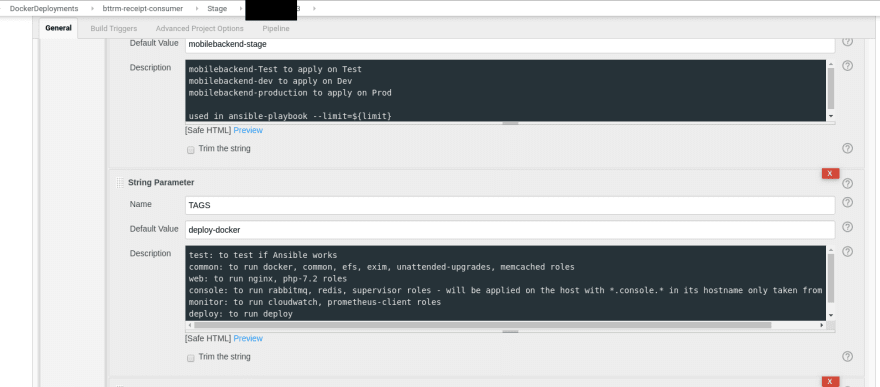 In addition to the AWS: create an Elastic Container Registry and Jenkins deploy job post – the next part, where we will create a new Jenkins job to deploy a Docker Compose file to run our Docker image.
In addition to the AWS: create an Elastic Container Registry and Jenkins deploy job post – the next part, where we will create a new Jenkins job to deploy a Docker Compose file to run our Docker image.
Docker Compose file will be updated by an Ansible role called docker-deploy, which will set the desired TAG, will copy this file to the host and will start a systemd-service.
To make this deployment works – need to create an authentification for the Docker daemon on the host – let’s use amazon-ecr-credential-helper for this.
In this post we will review:
Amazon-ecr-credential-helper
First, let’s run it manually.
As there is no existing package dor Debian OS – create a bash-script which will trigger amazon-ecr-credential-helper via docker:
#!/usr/bin/env bash
SECRET=$(docker run --rm -e METHOD=$1 -e REGISTRY=$(cat -) -v $HOME/.aws/credentials:/root/.aws/credentials pottava/amazon-ecr-credential-helper)
echo $SECRET | grep Secret
Set executable permissions:
root@bttrm-dev-console:/home/admin# chmod +x /usr/bin/docker-credential-ecr-login
Create an AWS profile so AWS CLI will create the ~/.aws/credentials file which will be used by the amazon-ecr-credential-helper:
root@bttrm-dev-console:/home/admin# aws configure
AWS Access Key ID [None]: AKI***6EZ
AWS Secret Access Key [None]: PpN***GNr
Default region name [None]: us-east-2
Default output format [None]: json
Update the ~/.docker/config.json config:
{
"credHelpers": {
"534***85.dkr.ecr.us-east-2.amazonaws.com": "ecr-login"
}
}
Here we set authentification for the 534***85.dkr.ecr.us-east-2.amazonaws.com repository by using the ecr-login authorizator.
Pull the image:
root@bttrm-dev-console:/home/admin# docker pull pottava/amazon-ecr-credential-helper
Using default tag: latest
latest: Pulling from pottava/amazon-ecr-credential-helper
...
Status: Downloaded newer image for pottava/amazon-ecr-credential-helper:latest
And try to run some docker pull for this ECR repository:
root@bttrm-dev-console:/home/admin# docker pull 534***385.dkr.ecr.us-east-2.amazonaws.com/bttrm-receipt-consumer
Using default tag: latest
latest: Pulling from bttrm-receipt-consumer
Digest: sha256:3bb7cebd34d7642b10fe44ad8ab375e5fd772fc82b4f6fa997c59833445fdef5
Status: Image is up to date for 534***385.dkr.ecr.us-east-2.amazonaws.com/bttrm-receipt-consumer:latest
Okay – it works.
Now, we need to do the same with Ansible.
Ansible deploy role
Create the Docker config template – roles/deploy-docker/templates/config.json.j2:
{
"credHelpers": {
"{{ bttrm_queue_consumer_repo }}": "ecr-login"
}
}
AWS CLI authentication file – roles/deploy-docker/templates/aws-credentials.j2:
[default]
aws_access_key_id = {{ bttrm_queue_consumer_login }}
aws_secret_access_key = {{ bttrm_queue_consumer_pass }}
Add variables in the group_vars/mobilebackend-dev.yml:
...
bttrm_queue_consumer_repo: "534***385.dkr.ecr.us-east-2.amazonaws.com"
bttrm_queue_consumer_image: "bttrm-receipt-consumer"
bttrm_queue_consumer_login: "AKI***6EZ"
bttrm_queue_consumer_pass: "PpN***GNr"
...
Create the bash-script template – roles/deploy-docker/templates/docker-credential-ecr-login-sh.j2:
#!/usr/bin/env bash
SECRET=$(docker run --rm -e METHOD=$1 -e REGISTRY=$(cat -) -v $HOME/.aws/credentials:/root/.aws/credentials pottava/amazon-ecr-credential-helper)
echo $SECRET | grep Secret
And a template for the Docker Compose file which will start the container – roles/deploy-docker/templates/bttrm-queue-consumer-compose.yml.j2:
version: '3.5'
services:
receipts:
container_name: bttrm-queue-consumer-{{ backend_project_name }}
image: {{ bttrm_queue_consumer_repo}}/{{ bttrm_queue_consumer_image}}:{{ bttrm_queue_consumer_tag }}
environment:
- APPLICATION_ENV={{ env }}
...
in thus Compose file Ansible will set the desired TAG taken from the Jenkins job’s parameters with the default value “latest“:
Create a systemd-unit file for the service – roles/deploy-docker/templates/bttrm-queue-consumer-systemd.yml.j2:
[Unit]
Description=bttrm-queue-consumer client
Requires=docker.service
After=docker.service
[Service]
Restart=always
WorkingDirectory={{ bttrm_queue_consumer_home }}
# Compose up
ExecStart=/usr/local/bin/docker-compose -f bttrm-queue-consumer-compose.yml up
# Compose down, remove containers and volumes
ExecStop=/usr/local/bin/docker-compose -f bttrm-queue-consumer-compose.yml down -v
[Install]
WantedBy=multi-user.target
In the roles/deploy-docker/tasks/main.yml add files copy and service start tasks:
- name: "Copy Docker config"
template:
src: "templates/config.json.j2"
dest: "/root/.docker/config.json"
when: "'console' in inventory_hostname"
- name: "Copy AWS CLI credentials config"
template:
src: "templates/aws-credentials.j2"
dest: "/root/.aws/credentials"
when: "'console' in inventory_hostname"
- name: "Copy Docker ECR credentials script"
template:
src: "templates/docker-credential-ecr-login-sh.j2"
dest: "/usr/bin/docker-credential-ecr-login"
when: "'console' in inventory_hostname"
- name: "Set Docker ECR credentials script executable"
file:
path: "/usr/bin/docker-credential-ecr-login"
mode: 0755
when: "'console' in inventory_hostname"
- name: "Create bttrm-queue-consumer home"
file:
path: "{{ bttrm_queue_consumer_home }}"
state: directory
mode: 0775
recurse: yes
when: "'console' in inventory_hostname"
- name: "Copy bttrm-queue-consumer Compose file"
template:
src: "templates/bttrm-queue-consumer-compose.yml.j2"
dest: "{{ bttrm_queue_consumer_home }}/bttrm-queue-consumer-compose.yml"
when: "'console' in inventory_hostname"
- name: "Copy bttrm-queue-consumer systemd file"
template:
src: "templates/bttrm-queue-consumer-systemd.yml.j2"
dest: "/etc/systemd/system/bttrm-queue-consumer.service"
when: "'console' in inventory_hostname"
- name: "Start bttrm-queue-consumer service"
service:
name: "bttrm-queue-consumer"
state: restarted
enabled: yes
daemon_reload: yes
when: "'console' in inventory_hostname"
Jenkins job
Create a Jenkins Pipeline job with the function ansibleApply():
...
def ansibleApply(app_rsa_id='1', bastion_rsa_id='2', tags='3', limit='4', playbookFile='5', passfile_id='6', connection='7') {
docker.image('projectname/projectname-ansible:1.1').inside('-v /var/run/docker.sock:/var/run/docker.sock') {
stage('Ansible apply') {
withCredentials([
file(credentialsId: "${app_rsa_id}", variable: 'app_rsa'),
file(credentialsId: "${passfile_id}", variable: 'passfile'),
file(credentialsId: "${bastion_rsa_id}", variable: 'bastion_rsa')
]) {
sh "ansible-playbook --private-key ${bastion_rsa} --tags ${tags} --limit=${limit} ${playbookFile} --vault-password-file ${passfile} --extra-vars \
\"ansible_connection=${connection} \
app_rsa_pem_key=${app_rsa} \
bastion_rsa_pem_key=${bastion_rsa}\""
}
}
}
}
...
Which will be called from the Jenkinsfile:
node {
...
// infra for CloudFormation
// from Jenkins job's parameters
TAGS = "${env.TAGS}"
// limit for hosts.ini
LIMIT = "${env.LIMIT}"
// playbook to run, e.g. mobilebackend.yml
PLAYBOOK = "${env.PLAYBOOK}"
// file with ansible vault password
// to be used in ansibleApply()'s withCredentials()
PASSFILE_ID = "${env.PASSFILE_ID}"
provision.ansibleRolesInstall()
provision.ansbileSyntaxCheck("${LIMIT}", "${PLAYBOOK}")
...
// ansibleApply(rsa_id='1', tags='2', limit='3', playbookFile='4', passfile_id='5', connection='6')
provision.ansibleApply( "${APP_RSA_ID}", "${BASTION_RSA_ID}", "${TAGS}", "${LIMIT}", "${PLAYBOOK}", "${PASSFILE_ID}", "${CONN}")
}
}
...
Here we are passing the deploy-docker tag from the Jenkins job’s parameters to the Ansible playbook:
And by this tag – Ansible will close the role to apply – tags: deploy-docker:
...
- role: deploy-docker
tags: deploy-docker
backend_project_name: "{{ lookup('env','APP_PROJECT_NAME') }}"
bttrm_queue_consumer_tag: "{{ lookup('env','BTTRM_QUEUE_CONSUMER_TAG') }}"
when: "'backend-bastion' not in inventory_hostname"
And during that will update the Docker Compose file with the bttrm_queue_consumer_tag value.
Deploy, check:
root@bttrm-stage-console:/opt/bttrm-queue-consumer# systemctl status bttrm-queue-consumer
● bttrm-queue-consumer.service - bttrm-queue-consumer client
Loaded: loaded (/etc/systemd/system/bttrm-queue-consumer.service; enabled; vendor preset: enabled)
...
Sep 26 16:06:23 bttrm-stage-console docker-compose[21251]: bttrm-queue-consumer-projectname-me-v3 | time="2019-09-26T13:06:23Z" level=info msg="Connecting as projectname_me_v3 to stage.backend-db3-master.example.world:3306/projectname_me_v3"
Sep 26 16:06:23 bttrm-stage-console docker-compose[21251]: bttrm-queue-consumer-projectname-me-v3 | time="2019-09-26T13:06:23Z" level=info msg="Declaring Queue (itunes-receipts)"
Sep 26 16:06:23 bttrm-stage-console docker-compose[21251]: bttrm-queue-consumer-projectname-me-v3 | time="2019-09-26T13:06:23Z" level=info msg="Waiting for queue messages..."
Done.




Top comments (0)